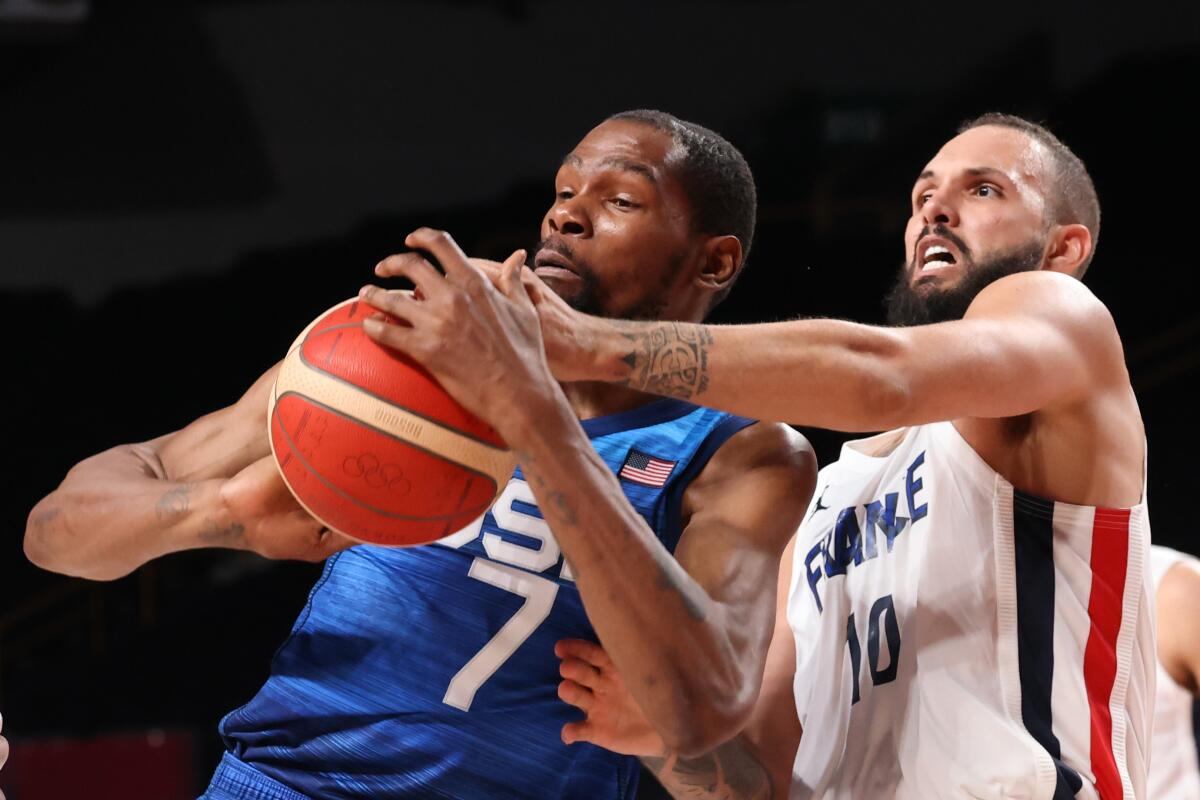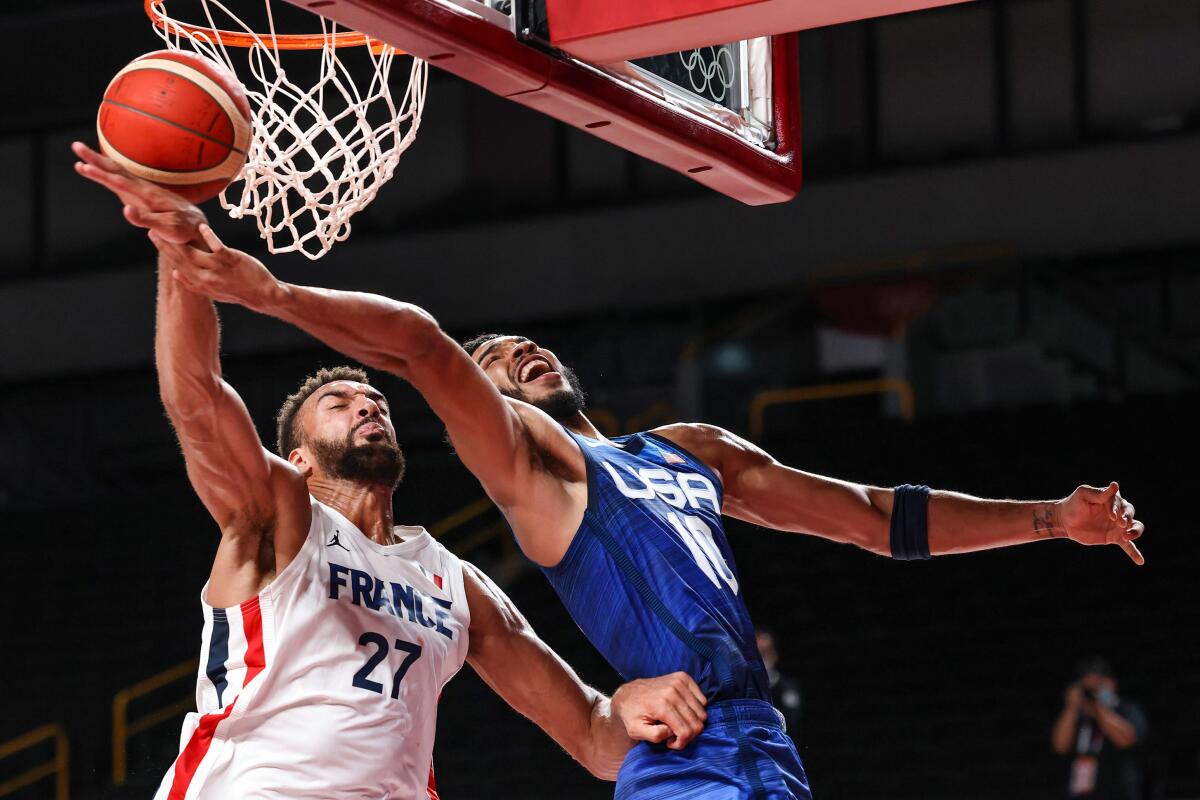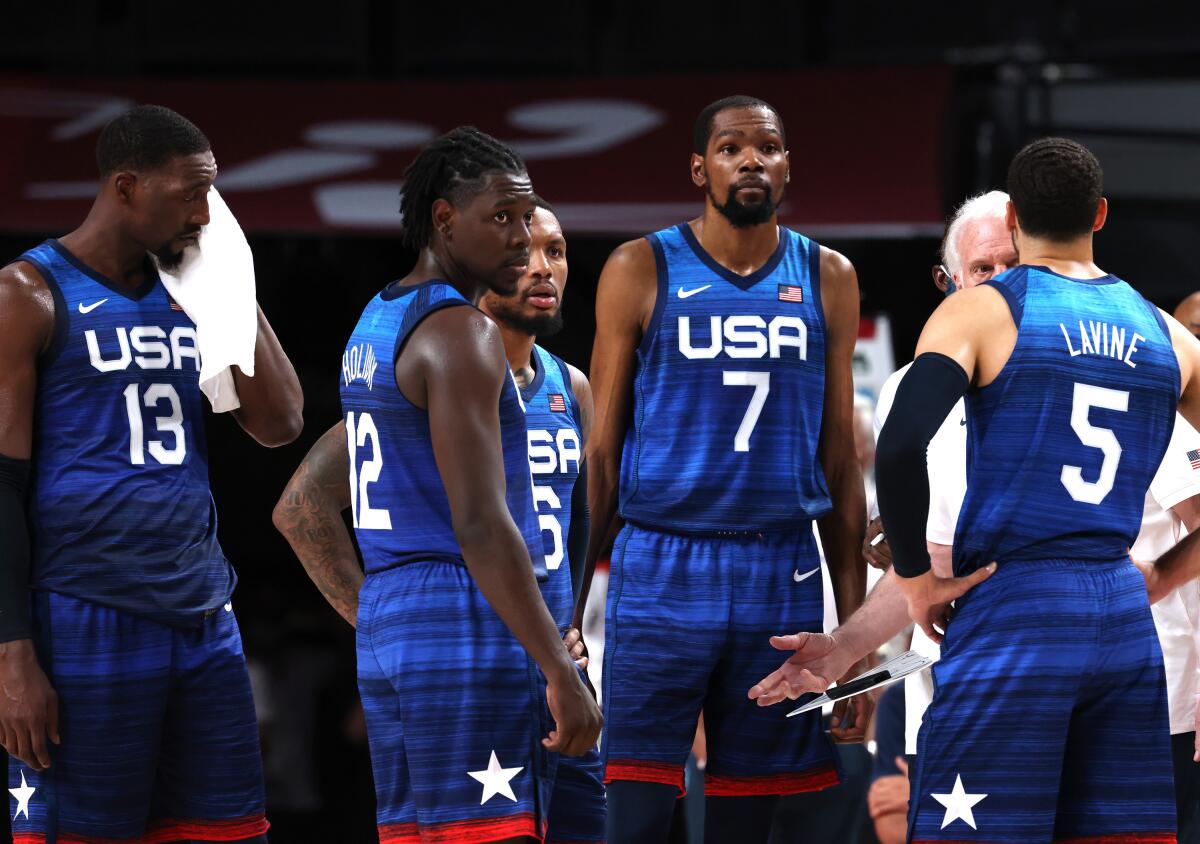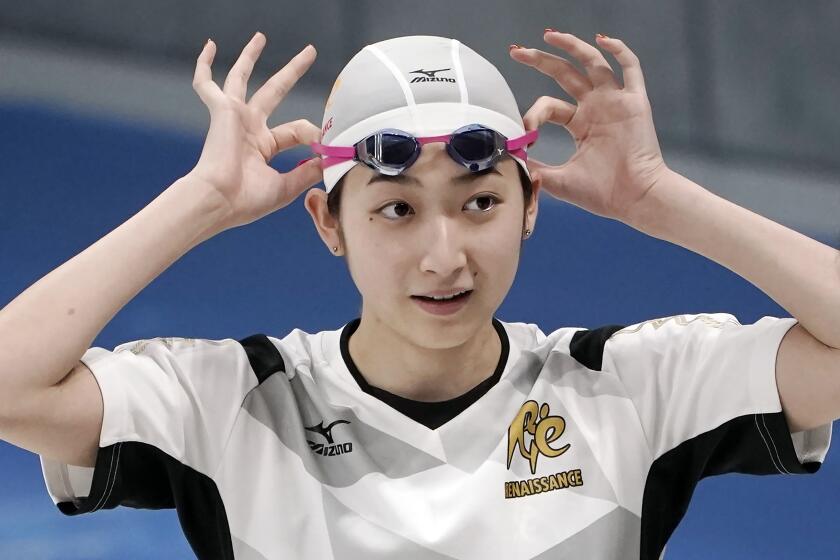News Analysis: U.S. men’s basketball falls to France for first Olympic loss since 2004

- Share via
SAITAMA, Japan — The walk off the floor from the Super Arena to the locker room is long, and Sunday it was quiet.
Damian Lillard never looked much past the toes of his sneakers, the weight of his disappointing Olympic debut pushing his head toward the floor. U.S. coach Gregg Popovich coldly stared ahead, leaving his fifth loss in his team’s last eight behind him.
And Kevin Durant jogged until his opponents got in his way. Late Sunday night, there he stood, stopped by the French once again.
How did this happen, the U.S. losing at their sport to a good-but-not-great opponent in their Olympic opener? How did the nation that houses the best league and creates most of the best players choke away a seven-point lead late in the fourth quarter?
It was all just, well, surprising.
“There’s nothing to be surprised about; that’s the part that confuses me a little bit,” Popovich said after the 83-76 loss, deciding to focus on semantics. “I don’t understand the word ‘surprise.’ That sort of disses the French team, so to speak, as if we were supposed to beat them by 30 or something. That’s a hell of a team. They’ve got a great coaching staff. They’ve got NBA players and other talented players playing in Europe [who have been] together for a long time.
“I don’t know why that would be a surprise. I think that’s a little bit of hubris — if you think the Americans are supposed to just roll out the ball and win.”
It’s unfortunate that Japanese swimmer Rikako Ikee’s return to the Olympics after a grueling battle with leukemia won’t be cheered on by fans.
This type of exchange isn’t new to anyone familiar with Popovich. When he also has a genuine respect for his opposition, you get an answer like this, with an emphasis on “hubris” based on a seeming overabundance of humility.
Although this isn’t the Dream Team, the Redeem Team or even the Wake Up Early to Stream Team, the U.S. starting five has 22 combined All-Star game appearances. The NBA players on every other team at the Olympics have been to nine fewer.
No one is expecting the U.S. to just show up and win, not with the quality of international players and teams. But what people do expect is for the U.S. to at least show up.
Instead, for 40 minutes Sunday night, we saw Durant foul out with only 10 points on four-of-12 shooting, The best from the U.S. being outscored by Nando de Colo? That’s not like Kevin Durant.

Lillard — cast as the team’s second-best player, with so many top American stars nursing injuries, enjoying vacation or promoting movies — was a mess, turning the ball over four times while playing with hesitancy especially in the clutch. It was as if “Dame Time” failed to update as it crossed time zone after time zone. He scored 11, including two meaningless free throws.
It forced the U.S. to rely on Jrue Holiday. Yes, the same Jrue Holiday who is still probably sweating out Champagne after the Milwaukee Bucks won the NBA title last week. He, Devin Booker and Khris Middleton didn’t arrive in Japan until late Saturday. And including three players from the NBA Finals does kind of sound like you’re expecting to just roll the ball onto the court and win.
It almost was good enough. The U.S. had a big lead and then blew it, only to reclaim it thanks to Holiday’s fourth-quarter brilliance. But in the game’s most important moments, the U.S. missed shot after shot — the bounces off the rim echoing through the mostly empty arena. By the time the clanging had stopped, the better players had lost.

“They are better individually,” French guard Evan Fournier said. “But they can be beaten as a team.”
That may be true now, but historically that’s almost never been the case.
On Aug. 9, 1936, the U.S. men’s team beat Estonia 52-28. It took them 36 years to lose again and another 16 to lose after that. They’d won 25 straight games since scuffling in 2004 (Popovich was an assistant on that team) before losing Sunday.
Unable to draw energy from crowds because of COVID-19 restrictions, athletes at the Tokyo Olympics try to overcome the ‘uncomfortable’ situation.
It’s Popovich’s fifth loss as the U.S. coach, a stretch that includes no medal at the FIBA World Cup in 2019 and two exhibition losses prior to these Games that seem more like prophecies than tune-ups. He cannot escape responsibility for that even if the pandemic, the NBA schedule and so many other circumstances have put the U.S. team in this position.
“We have to continue to get better,” Draymond Green said. “Obviously, we haven’t been together that long, but you know, we’ve been together long enough to have consistency.”
No one reasonably should believe that this team could be consistent, not with the late additions of five new players since the start of training camp — the Finals trio plus Keldon Johnson and JaVale McGee replacing Bradley Beal and Kevin Love.
But still. This is the USA. It’s basketball.
And if those losses don’t feel like a surprise, then the team has some major problems.
More to Read
Go beyond the scoreboard
Get the latest on L.A.'s teams in the daily Sports Report newsletter.
You may occasionally receive promotional content from the Los Angeles Times.









